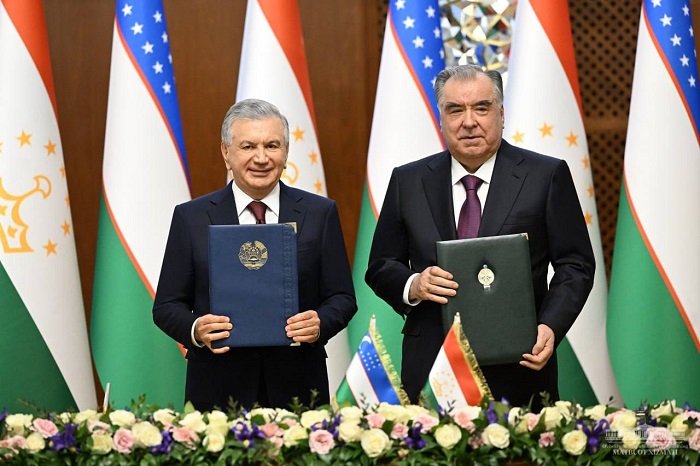In a landmark development for Central Asia, Uzbekistan and Tajikistan signed a Treaty on Allied Relations on Thursday, 18 April 2024. The agreement was signed by President of Uzbekistan Shavkat Mirziyoyev and President of Tajikistan Emomali Rahmon following high-level talks in Dushanbe.
The President of Uzbekistan is on a two-day state visit to Tajikistan.
At a press conference after the talks, Mirziyoyev said that the signing of the Treaty on Allied Relations, which fully meets the fundamental interests of the two fraternal peoples, was a truly historic result of the current visit.
“The agreement will contribute to a wider untapping of the potential of our cooperation. This document will also become an important factor in strengthening peace and stability in our region – Central Asia,” Rahmon stressed.
In addition, the sides signed 28 documents covering almost all areas of Uzbek-Tajik cooperation.
In particular, for the development of regional relations between the two countries, 5 cooperation agreements were signed between the executive authorities of the Khatlon and Sughd regions of Tajikistan and the authorities of the Khorezm, Ferghana, Syrdarya, Namangan and Andijan regions of Uzbekistan.
Agreements, protocols, memoranda, roadmaps and cooperation programs regulate the development and expansion of cooperation in important and priority areas for both sides of the border, consumer protection, industry, air communications, international automobile communications, bridge construction, agro-industrial complex, veterinary and food safety, culture, librarianship, training in the fields of virology, microbiology, molecular biology, epidemiology, biotechnology and pharmacology, certification of scientific personnel, teaching of the highest qualification, tourism and supervision of the activities of credit institutions.
In terms of economic cooperation, the presidents set the task for the governments of their countries to bring trade turnover to $ 2 billion, including through active substitution of imports from third countries. Over the past seven years, the trade turnover between the two countries has grown almost 40 times and reached $750 million in 2023. Currently, there are 370 Tajik-Uzbek joint ventures operating on the territory of the two countries.
During the negotiations, the importance of accelerating the creation of the free trade and border zone “Oybek-Fotekhobod” and the trade and logistics center “Andarkhan” was noted.
The agreements prioritize development of industrial cooperation through joint projects in mechanical engineering, energy, electrical engineering, metallurgy, mining, textile, pharmaceutical, agro-industrial and other priority sectors.
The Uzbek-Tajik Investment Company will play a crucial role in supporting these large-scale projects.
Water and energy remain a top priority for cooperation. The leaders reaffirmed their commitment to working together on managing transboundary water resources. This collaboration is essential for ensuring water security and powering sustainable development across the region.
During the talks, the parties noted the importance of further expanding cooperation in the energy sector. Special attention was paid to the implementation of a joint project for the construction of two hydroelectric power plants in the Zarafshan River basin.
The necessary measures to ensure the parallel operation of the energy system of Tajikistan and the Unified Energy System of Central Asia were discussed.
Recognizing the importance of connectivity, the leaders directed their governments to explore opening new air routes between Uzbek and Tajik cities. Additionally, they emphasized increasing flight frequency between the capitals, Tashkent and Dushanbe.
Presidents Mirziyoyev and Rahmon underscored their commitment to ongoing collaboration within regional organizations and on the international stage. The joint efforts will be aimed at promoting interests and ensuring sustainable development in Central Asia.
The discussions highlighted the importance of maintaining close contact to address modern threats and challenges facing the region. Furthermore, both leaders acknowledged the need to support socio-economic development projects in Afghanistan, fostering stability and prosperity for their neighbor.
To ensure the successful implementation of all these agreements, the heads of state instructed their governments to develop a joint roadmap. ///nCa, 19 April 2024
